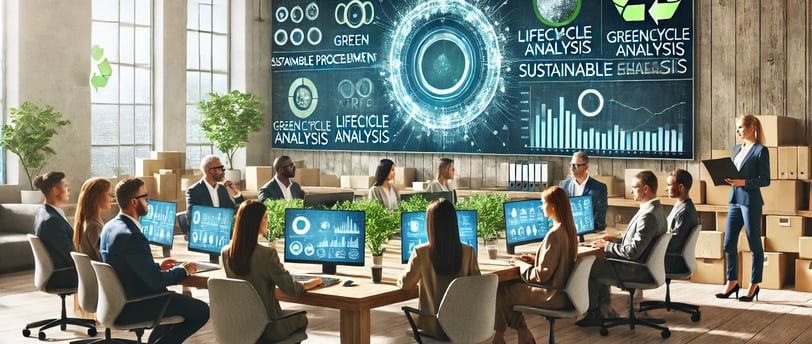Implementing Sustainable Procurement: Strategies for Eco-Friendly Supply Chains
Learn how to implement sustainable procurement practices with Novus Procurement. Discover strategies for building eco-friendly supply chains, reducing environmental impact, and promoting social responsibility.
Arun Raju
7/22/20243 min read


Introduction
Sustainable procurement is essential for organizations aiming to reduce their environmental impact, promote social responsibility, and achieve long-term savings. Novus Procurement specializes in helping businesses implement sustainable procurement practices. In this blog post, we explore key strategies for building eco-friendly supply chains.
The Importance of Sustainable Procurement
Sustainable procurement focuses on purchasing goods and services that have minimal environmental impact and promote social responsibility. Key benefits include:
Environmental Protection: Reducing waste, emissions, and resource consumption.
Cost Savings: Achieving long-term savings through efficient resource use and waste reduction.
Brand Reputation: Enhancing brand image by demonstrating commitment to sustainability.
Regulatory Compliance: Meeting environmental and social regulations and standards.
Key Strategies for Sustainable Procurement
Setting Clear Sustainability Goals
Define clear, measurable sustainability goals aligned with your organization’s overall strategy. This includes:
Defining Objectives: Setting specific sustainability targets for procurement activities.
Performance Metrics: Establishing metrics to measure progress towards sustainability goals.
Continuous Improvement: Regularly reviewing and updating sustainability goals to reflect changing priorities and market conditions.
Collaborating with Suppliers
Work closely with suppliers to promote sustainability throughout the supply chain. Key practices include:
Supplier Assessments: Conducting regular assessments to evaluate suppliers' sustainability practices.
Partnerships: Building long-term partnerships with suppliers committed to sustainability.
Capacity Building: Providing training and support to help suppliers improve their sustainability practices.
Leveraging Technology for Sustainability
Utilize technology to enhance sustainable procurement efforts. Important technologies include:
Sustainability Analytics: Using data analytics to track and measure the environmental and social impact of procurement activities.
e-Procurement Systems: Implementing e-procurement systems to streamline processes and reduce paper waste.
Blockchain: Leveraging blockchain technology to enhance transparency and traceability in the supply chain.
Implementing Sustainable Procurement Practices
Educating and Training Staff
Ensure that procurement staff understand the importance of sustainability and are equipped with the necessary skills. This includes:
Training Programs: Providing training on sustainable procurement practices and tools.
Awareness Campaigns: Raising awareness about the benefits of sustainable procurement within the organization.
Best Practice Sharing: Encouraging staff to share best practices and success stories.
Monitoring and Reporting Progress
Regularly monitor and report on progress towards sustainability goals. Key practices include:
Sustainability Audits: Conducting regular audits to assess compliance with sustainability standards.
Performance Reports: Preparing regular reports to track progress and identify areas for improvement.
Stakeholder Communication: Communicating progress to stakeholders, including employees, customers, and investors.
Best Practices for Sustainable Procurement
Standardizing Procurement Processes
Standardizing procurement processes ensures consistency and efficiency, leading to cost savings. This includes:
Developing Policies and Procedures: Establishing clear procurement policies and procedures to guide purchasing decisions.
Automating Processes: Using procurement software to automate routine tasks and reduce manual effort.
Training and Development: Providing training for procurement teams to ensure they follow best practices and are up-to-date with industry trends.
Optimizing Inventory Management
Effective inventory management helps reduce holding costs and minimize waste. Key practices include:
Demand Forecasting: Using historical data and market trends to predict future demand and optimize inventory levels.
Just-In-Time (JIT) Inventory: Implementing JIT inventory practices to reduce excess stock and associated costs.
Regular Audits: Conducting regular inventory audits to identify and address inefficiencies.
Leveraging Technology
Technology plays a vital role in reducing procurement costs. Key technologies include:
e-Procurement Systems: Using e-procurement platforms to streamline the purchasing process and improve transparency.
Data Analytics: Employing data analytics to gain insights into spend patterns, supplier performance, and cost-saving opportunities.
Automation: Automating routine tasks to improve efficiency and reduce the risk of errors.
Case Studies
Novus Procurement has helped numerous organizations implement sustainable procurement practices, leading to significant environmental, social, and economic benefits. Our case studies highlight successful initiatives and the positive impact of sustainable procurement.
Conclusion
Sustainable procurement is essential for building a greener supply chain and achieving long-term savings. By setting clear goals, collaborating with suppliers, leveraging technology, and educating staff, organizations can significantly reduce their environmental impact and promote social responsibility. Novus Procurement offers expert guidance and tailored solutions to help your organization implement sustainable procurement practices. Contact us today to learn more about our sustainability services.
FAQs
1. What is sustainable procurement, and why is it important? Sustainable procurement involves purchasing goods and services with minimal environmental impact and promoting social responsibility. It is important for environmental protection, cost savings, brand reputation, and regulatory compliance.
2. How can Novus Procurement assist with sustainable procurement? Novus Procurement provides expert guidance on setting sustainability goals, collaborating with suppliers, leveraging technology, and educating staff to implement sustainable procurement practices.
3. What are some key strategies for sustainable procurement? Key strategies include green sourcing, lifecycle analysis, waste reduction, ethical sourcing, supplier diversity, and community engagement.
4. How does technology support sustainable procurement? Technology supports sustainable procurement through sustainability analytics, e-procurement systems, and blockchain for transparency and traceability.
5. How can organizations monitor and report progress in sustainable procurement? Organizations can monitor and report progress through sustainability audits, performance reports, and stakeholder communication.
Novus Procurement
Providing tailored solutions to drive procurement efficiency and cost savings.
Need Help?
info@novusprocurement.com
© 2024. All rights reserved.
Suite 2009 - 1470 Midland Avenue,
Toronto, M1P 4Z4
